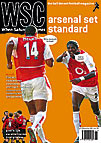 Rosenborg are no longer unchallenged in Norwegian football and now face new problems caused by their years of dominance. PJ Bakke explains
Rosenborg are no longer unchallenged in Norwegian football and now face new problems caused by their years of dominance. PJ Bakke explains
Acombination of soaring wages and a failure to sell players abroad has created a financial crisis at several Norwegian clubs. Some are considering going semi-professional. The perennial champions Rosenborg, however, live in a different world, thanks to the distorting effect of the Champions League. Having qualified eight years running, they have built up massive bank reserves and have a lovely new stadium to boot. At the time of writing they are on course for their 11th consecutive league title with four games to go, but there are signs that their total dominance may finally be challenged.
During the 1990s the team from Trondheim often won the league at a canter, but last season they left it late, pipping Lillestrom by a single point. This year the main challenge, to everyone’s surprise, has come from Lyn. From the posh west side of Oslo – they are said to be the only club capable of gathering 100 fans in dinner jackets in under an hour – Lyn had a turbulent close season after the coach Stuart Baxter upped sticks to work at the English FA.
Their owner, the multimillionaire Atle Brynestad, failed to find a replacement before the season started and left Baxter’s assistant Sture Fladmark temporarily in charge. The search for a new coach did not end until the season was half over, by which time Fladmark had taken unfancied Lyn ten points clear at the top of the table.
Perhaps feeling dizzy up there, Brynestad then removed Fladmark and replaced him with the former assistant coach of Croatia, Hrvoie Braovic, who had been recommended by Brynestad’s Croatian faith healer. Braovic is a highly educated and by all accounts capable coach, but he had a thankless task. Not only did the players have difficulty understanding him, but introducing the unfamiliar concept of keeping possession for more than ten seconds must also have confused them no end.
The players complained that his methods were “suited for housewives rather than footballers” and after winning his first match in charge the team suffered a terrible loss of form which coincided with a remarkable run for Rosenborg. A ten-point lead was overhauled in just four games and Braovic lasted less than three months. Fladmark was reinstated in September and the players seem happy, despite having publicly criticised him before the season began.
Rosenborg’s main concern is the age of their squad. Few young players are good enough to break into the side, and those who do invariably get snapped up by larger European clubs. In September against Inter the midfield trio had a combined age of 101. Not surprisingly, a certain level of complacency has also crept in and some players freely admit to being able to motivate themselves only for Champions League games.
The trouble is that those games may become less frequent, thanks paradoxically to Rosenborg’s own dominance at home. Dwindling standards mean not only that Rosenborg have to raise their game considerably when playing in Europe, but also that other clubs are failing to make an impact when they qualify, dragging down Norway’s ranking.
Not too long ago Brann and Valerenga reached the quarter-finals of the Cup-Winners Cup, losing to Liverpool and Chelsea respectively. In this year’s UEFA Cup Brann lost twice to Suduva of Lithuania, who were then hammered 8-1 by Celtic. Performances like that mean Rosenborg risk losing their Champions League seeding, and may have to face the likes of Barcelona rather than Brondby in the qualifying round next year.
This season marks the end of an era as the living legend Nils Arne Eggen retires as coach of Rosenborg. Since taking charge in 1988, his attacking philosophy and motivational skills, rather than the quality of his players, have been the basis of his side’s unprecedented success. This becomes evident when players are sold. Many seem like fish out of water when they leave Rosenborg, as observers of Bjorn Kvarme and Harald Brattbakk can testify.
Few believe Eggen’s retirement signals the beginning of the end for Rosenborg. His successor Age Hareide (once of Man City and Norwich) has a successful coaching career behind him, and has already been heavily involved in order to make the transition a smooth one. There’s probably a lesson in there for Lyn.
From WSC 189 November 2002. What was happening this month